Learn the Past Simple Tense
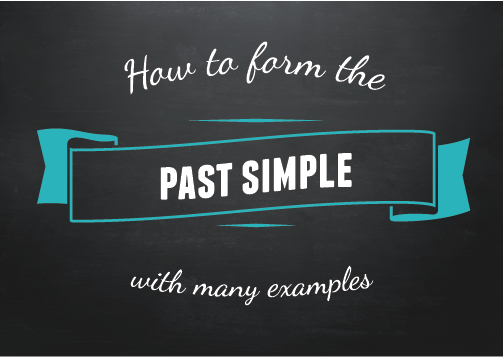
Let's learn how to form the past simple tense (also called the simple past tense).
First we'll look at the important verb "to be" and then we'll learn how to form the tense with other verbs. We'll learn how to make positive and negative forms, short forms (contractions) and questions.
[Note: Click here to learn how to use the past simple.]
Past simple with the verb "be"
We use the verb "to be" in the simple past with either a noun, adjective or prepositional phrase:
- I was a university student. (with a noun)
- You are happy. (with an adjective)
- He was in the army. (with a prepositional phrase)
This chart shows the form of the verb "to be" in the positive (affirmative) form:
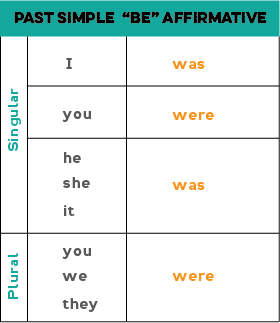
Examples:
- I was happy yesterday.
- He was a doctor for ten years.
- She was sick yesterday. She was tired.
- It was a beautiful day. It was warm and sunny.
- We were friends for many years.
- You were late for class. You were embarrassed.
- The cookies were really delicious.
Yes/no questions with verb "be"
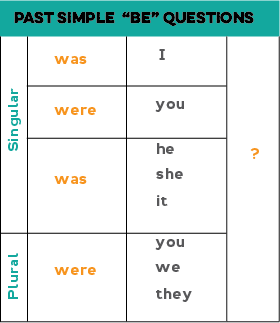
Questions that can be answered with "yes" or "no" answers are formed by inverting the subject and "was" or "were". Inverting simply means we change the order of the subject and verb form:
Affirmative statement: I was late. (the subject "I" is first, then the verb form "was")
Affirmative question: Was I late? (to make a question, the verb form "was" comes first then the subject "I").
Examples:
- Was I late for the bus?
- Was he previously married?
- Was she a brave woman?
- Was that cookie delicious?
- Were we happy children?
- Were you teachers kind in elementary school?
- Were your seats at the game very good?
Yes / no questions answers with "be"
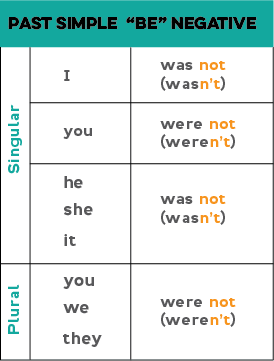
We can answer yes / no questions with the verb "be" using a full or a shorter answer. We can use contractions (wasn't / weren't) with negative answers.
Examples:
Were you late for class?
- Yes, I was late for class.
- Yes, I was. (short answer)
- No, I was not late for class.
- No, I wasn't late.
Were they hungry?
- Yes, they were hungry.
- Yes, they were. (short answer)
- No, they were not.
- No, they weren't hungry.
Wh- questions past simple with "to be"
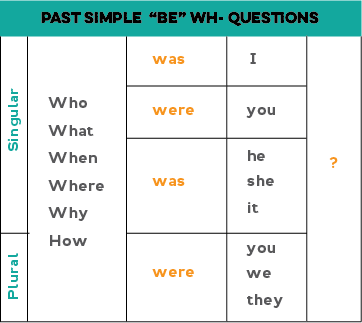
Examples:
- Where was she today?
- How were the apples? Were they delicious?
- Why were the children sad?
- What was your last name before marriage?
- What were their favorite books as children?
- Where were they last week?
- How was the weather during your holiday?
Past simple with other verbs
To form the past simple tense with other verbs add "ed" to the infinitive form of the verb. We use the same form for each subject (e.g., I, you, he). It's easy!
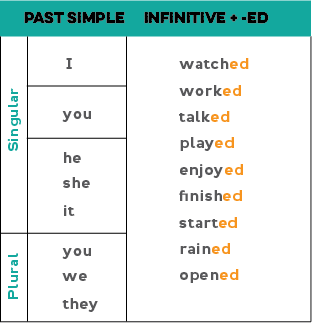
Examples:
- My son enjoyed the birthday party yesterday.
- The concert started 15 minutes ago.
- We opened the store early this morning
- I worked five days this week.
- My girlfriend and I talked for six hours yesterday.
- They played 80s music at the club last night.
Exceptions past simple tense
There are many irregular verbs in the past simple.
Examples:
- We went to the movies last night. (NOT: we "goed")
- I did my homework and after that I ate dinner. (NOT: "doed" or "eated")
- I had two dogs. One ran away. (NOT: "haved" or "runned")
Unfortunately, you have to memorize them. Here are many more examples:
|
be — was / were become — became begin — began break — broke bring — brought buy — bought catch — caught choose — chose come — came cost — cost cut — cut do — did draw — drew drink — drink drive — drove eat — ate fall — fell feel — felt fight — fought |
find — found fly — flew forget — forgot get — got give — gave go — went grow — grew hang — hung have — had hear — heard hide — hid hit — hit hold — held hurt — hurt keep — kept know — knew leave — left lend — lent let — let |
light — lit lose — lost make — made mean — meant meet — met pay — paid put — put read — read ride — rode ring — rang rise — rose run — ran say — said see — saw sell — sold send — sent shine — shone shoot — shot shut — shut |
sing — sang sit — sat sleep — slept speak — spoke spend — spent stand — stood steal — stole swim — swam take — took teach — taught tear — tore tell — told think — thought throw — threw wake — woke wear — wore win — won write — wrote |
Spelling changes with past simple
There are also some spelling changes with this tense:
1. If the verb ends with "y", we change it to -i and add -ed (but only if there's a consonant before the -y):
- Try — tried
- spy — spied
2. If the verb ends with "e" , we add just a "d" (not "ed"):
- closed — closed (NOT: closeed)
- measure — measured
3. Double the final consonant after a short stressed vowel if the verb ends in a CVC (consonant vowel consonant)*:
- plan — planned
- benefit — benefitted
*except CVC endings with w, x, or y
Examples:
- My brother studied English last night. (study — studied: "y" becomes "i" then add "ed")
- My baby cried all night. (cry — cried)
- The other student copied the answers from my test. (copy — copied)
- The basketball player bounced the ball. (bounce — bounced: just add "d" not "ed")
- She measured my hips and waist for the dress. (measure — measured)
- I stopped the car suddenly. (stop — stopped: double the "p")
- The sprinter benefitted from a tailwind during the 100m race. (benefit — benefitted)
- The mother planned a surprise party. (plan — planned)
Negative form of the past simple
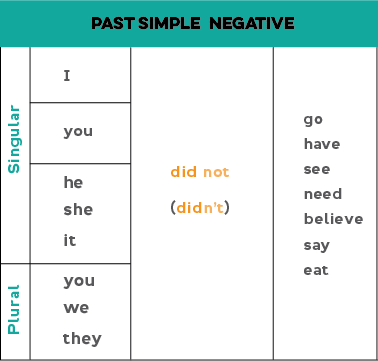
For the negative, we add did not (or didn't) for all subject forms and the infinitive.
- Correct: He didn't work today.
- NOT correct: He didn't worked today. (do not add an "ed" to "work")
Carefully note that we just add "did not" or "didn't" plus the infinitive so there are no irregular negative past forms.
- Correct: He didn't go today.
- NOT correct: He didn't went today. (There are no irregular negative forms... yay!)
Examples:
- I didn't play video games today. / I did not play video games.
- My mother didn't tell me anything.
- We didn't sleep much last night. / We did not sleep during the flight.
- The teacher didn't give any homework. / The teacher didn't remember my name.
- She didn't like my gift. / I did not spend much money on it.
Yes / No questions with the past simple
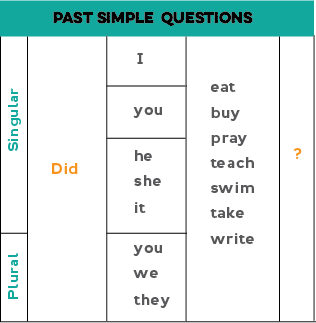
Examples:
- Did you swim today?
- Did I teach a class last week?
- Did he take any photography classes at the university?
- Did you eat candy this week?
- Did they buy a new car?
Wh- questions with the past simple
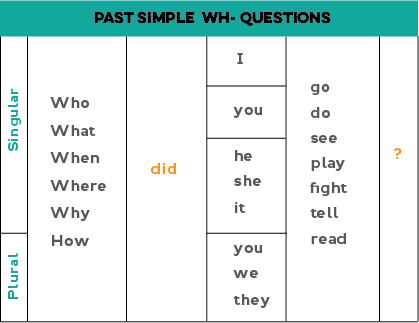
Notice the word order. The wh- question word comes before "did" and then the infinitive.
Examples:
- How long did you study English?
- How often did he smoke cigarettes?
- Where did your mother live when she was a girl?
- Why did you do that?
- Who did he bring to the dance yesterday?
- What did the girl have in her bag?
- How much meat did your dog eat?
Practice Quiz
Are you ready for a short quiz? Click the "start" button below to begin.
Whew! We covered a lot of information on this page.
Click here to learn when to USE the past simple.
- Home Page ›
- Main Grammar Page ›
- Use: Past simple >
- Form: Past simple
